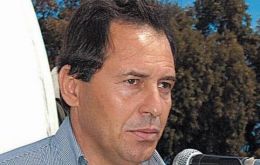MercoPress. South Atlantic News Agency
Energy & Oil
-
Saturday, May 8th 2010 - 01:23 UTC
Falklands’ Rockhopper “High Quality Reservoir” Oil Find Boosts Shares

Rockhopper Exploration (LON:RKH) oil discovery in the Falklands Islands is of “good” quality said on Friday a release from the company. The announcement had a positive impact on shares of all Falklands’ oil explorers.
-
Thursday, May 6th 2010 - 20:02 UTC
New Natural Gas Discoveries in the Extreme South of Chile

Argentine based GeoPark Holdings (LON:GPK) has reported the successful testing of two new wells on the Fell Block in southern Chile.
-
Thursday, May 6th 2010 - 13:45 UTC
Oil Exploration Data Indicates the First Oil Discovery in the North Falklands Basin.

In a press release from Rockhopper Exploration (LON:RKH), the company says “the North Falkland Basin oil and gas exploration company, is pleased to announce that well 14/10-2 on the Sea Lion prospect has reached a depth of 2,744 metres.”
-
Thursday, May 6th 2010 - 05:34 UTC
China’s Main Oil Corporation Closes 3.1 Billion Deal with Argentina’s Bridas

China National Offshore Oil Corporation, CNOOC (NYSE:CEO) Ltd said on Wednesday it had closed a 3.1 billion US dollars deal with Argentina’s Bridas Energy Holdings (BEH) to buy a 50% stake in Bridas Corporation, a wholly owned subsidiary of BEH.
-
Wednesday, May 5th 2010 - 22:03 UTC
Petrobras Argentina Sells Parts of its Assets to Kirchner Couple Close Friend

Petrobras Energía (NYSE:PZE), Brazil’s government managed oil and gas corporation announced it will sell part of its assets in Argentina to Oil Combustibles SA for 110 million US dollars, including a refinery, gasoline stations and inventories.
-
Wednesday, May 5th 2010 - 21:19 UTC
France Demands “Fair and Prompt” Compensation for Bolivian Nationalizations

France's government demanded “fair and prompt” compensation from Bolivia for the nationalization of a power plant half-owned by French utility GDF Suez (EPA:GSZ).
-
Friday, April 30th 2010 - 01:16 UTC
Repsol YPF Plans to Raise Cash to Keep Expanding in Brazil

Repsol YPF S.A. (BMAD:REP), Spain’s biggest oil company, is considering the sale of about 40% of its Brazil assets in an initial public offering as early as this year, company executives said Thursday on a conference call.
-
Wednesday, April 28th 2010 - 03:22 UTC
Falklands Military Base to be Powered by Wind, Following on Stanley’s Success

Authorities at the Falkland Islands Mount Pleasant military base (MPC) have confirmed their interest in developing a wind farm that could bring the Falkland Islands Government (FIG) considerable benefits.
-
Tuesday, April 27th 2010 - 23:09 UTC
Paraguayan Press Blasts 37 Anniversary of Brazilian “Imperial Itaipú Treaty”

Paraguay’s president Fernando Lugo said he is looking forward to the coming meeting next May 3 with his Brazilian counterpart Lula da Silva because he would be coming back with “good news” referred to the shared power from Itaipu, the world’s second largest hydroelectric dam belonging to both countries.
-
Saturday, April 24th 2010 - 07:34 UTC
US Navy Celebrates Earth Day With Flight Test of “Green” F/A Super Hornet

The United States Navy celebrated Earth Day April 22 by showcasing a flight test of the “Green Hornet,” an F/A-18 Super Hornet multi-role fighter jet powered by a 50/50 blend of conventional jet fuel and camelina aviation bio-fuel.
